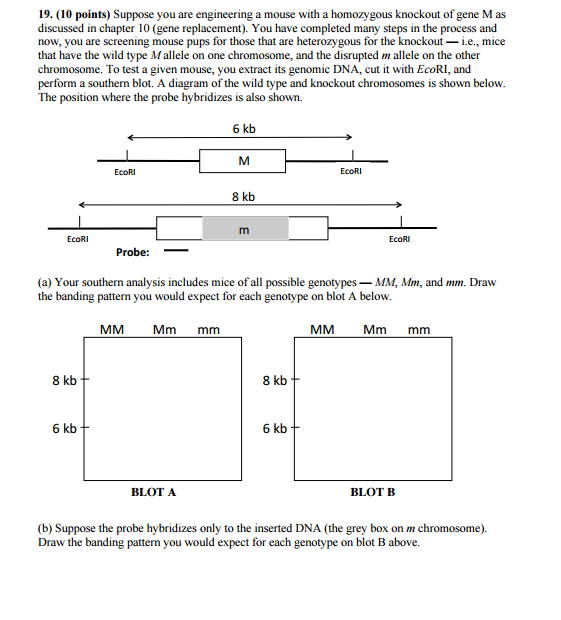Question: Suppose you are engineering a mouse with a homozygous knockout of gene M as discussed in chapter …

Show transcribed image text Suppose you are engineering a mouse with a homozygous knockout of gene M as discussed in chapter 10 (gene replacement). You have completed many steps in the process and now, you are screening mouse pups for those that are heterozygous for the knockout – i.e., mice that have the wild type M allele on one chromosome, and the disrupted m allele on the other chromosome. To test a given mouse, you extract its genomic DNA, cut it with EcoRI, and perform a southern blot. A diagram of the wild type and knockout chromosomes is shown below. The position where the probe hybridizes is also shown. Your southern analysis includes mice of all possible genotypes – MM, Mm, and mm. Draw the banding pattern you would expect for each genotype on blot A below. Suppose the probe hybridizes only to the inserted DNA (the grey box on m chromosome). Draw the banding pattern you would expect for each genotype on blot B above.
Suppose you are engineering a mouse with a homozygous knockout of gene M as discussed in chapter 10 (gene replacement). You have completed many steps in the process and now, you are screening mouse pups for those that are heterozygous for the knockout – i.e., mice that have the wild type M allele on one chromosome, and the disrupted m allele on the other chromosome. To test a given mouse, you extract its genomic DNA, cut it with EcoRI, and perform a southern blot. A diagram of the wild type and knockout chromosomes is shown below. The position where the probe hybridizes is also shown. Your southern analysis includes mice of all possible genotypes – MM, Mm, and mm. Draw the banding pattern you would expect for each genotype on blot A below. Suppose the probe hybridizes only to the inserted DNA (the grey box on m chromosome). Draw the banding pattern you would expect for each genotype on blot B above.



